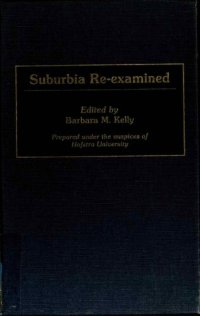
Ebook: Suburbia Re-Examined
Author: Barbara M. Kelly (editor)
- Series: Controversies in Science, 78
- Year: 1989
- Publisher: Praeger
- Language: English
- pdf
The changing nature and definition of suburbia, past and present, and the processes that have influenced its development both physically and as an intellectual construct are examined from various perspectives by the authors of the 26 essays that compose this work. The revolutions in transportation and communication and their effects upon home and workplace, city and suburb, are among the issues explored in provocative essays by experts in the field who consider a broad spectrum of topics relative to the suburban experience. Noted urban historian Sam Bass Warner, Jr., provides a fascinating overview of the subject, urging urban scholars to focus on current conditions rather than on solving old problems.
The changing nature and definition of suburbia, past and present, and the processes which have influenced its development both physically and as an intellectual construct are examined, from various perspectives, by the writers of the 26 essays that compose Suburbia Re-examined. These chapters were drawn from papers presented in June 1987 at a conference on suburbia sponsored by the Long Island Studies Institute at Hofstra University. Escalated prices for single family homes have in effect closed the gates to suburbia for many of the young and the elderly. Diverse quality-of-life environmental problems, including water supply, have become matters of real concern to experts and suburban dwellers alike. Interestingly, as industry, commerce, and corporate headquarters continue to proliferate in what were once bedroom communities serving nearby cities, even the usefulness of the term suburbia for these varied communities has come into question. The revolutions in transportation and communication and their effects upon home and workplace, city and suburb, are among the issues explored in provocative essays by experts in the field who consider a broad spectrum of topics relative to the suburban experience including regional patterns of development, real estate and banking, public policy, transportation, the role of the federal government, the home, the family, the future, and more.
Sam Bass Warner, Jr.'s introduction, When Suburbs Are the City, furnishes an overview of perspectives relative to the study of suburbia as city and he urges urban professionals to focus on current conditions rather than on solving old problems. In tracing the roots of urban research analysis to economics, art, and literary criticism, this noted urban historian finds these approaches to urban study limited and limiting. Warner proposes that students of suburbia use the house, and all the people and activities associated with it, as the basis for explorations and explanations of current social phenomena, and that the primary concern, the core of urban studies, should explicitly be concerned for family well-being in this setting. Urban historians, sociologists, planners, real estate and banking professionals, economists, architects, public policy administrators, informed generalists, and anyone with an interest in the continuing evolution of suburbia will find that Suburbia Re-examined provides the background necessary to an understanding of this challenging and ubiquitous subject.